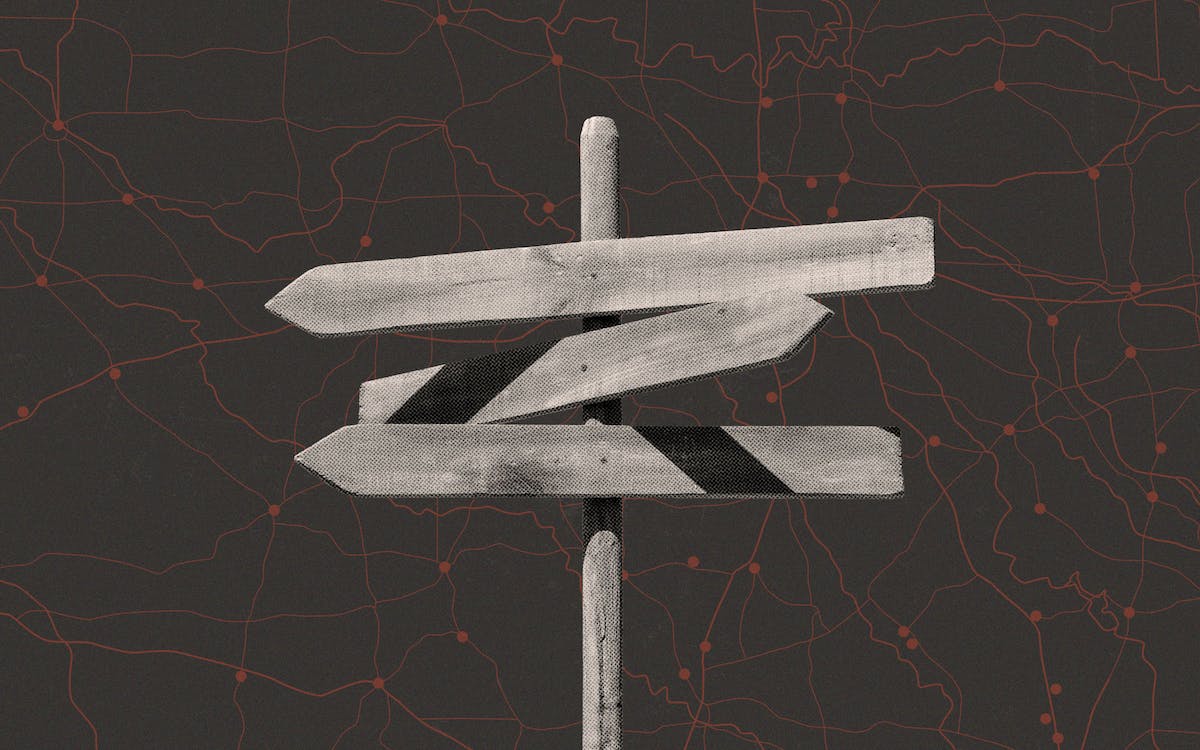Located about an hour southwest of Dallas, Squaw Valley Golf Course features nearly five hundred acres of undulating greenery lined by century-old oak trees and a creek that meanders through the property. The picturesque escape is consistently ranked as one of the top courses in the state. About three hours south, in tiny Doss, Texas, in an area that saw numerous nineteenth century clashes between German settlers and Native Americans, Squaw Creek Primitive Baptist Church sits on a grassy plot alongside the creek after which it’s named. About two hundred miles away in West Texas, “Squawteat Peak” (formerly “Squawtit Peak”), a rocky, three-hundred-foot-tall mound that is said to resemble a woman’s breast, overlooks Interstate 10, forty miles east of Fort Stockton.
Though Texas has reserved only about five thousand acres for Native American communities, hundreds of towns and geographical features bear names related to the state’s indigenous past. These names are often derogatory labels that native Texans say reinforce stereotypes. Recently, efforts to address the state’s racist nomenclature have taken on new urgency. This year, the state legislature passed a resolution asking the federal government to change sixteen place names that use the word “Negro,” the culmination of a three-decades-long effort to overhaul Texas maps. But racist labels directed at Indigenous peoples, whose communities were decimated by Texas settlers in a protracted period of violence some modern observers liken to ethnic cleansing, have thus far largely avoided review. In the rare instances when officials have considered renaming towns, residents have often been resistant to change, arguing that the meaning of many historically problematic words has evolved over time, stripping them of their original intent. Such was the case in 2005, when those who lived in White Settlement, just west of Fort Worth, overwhelmingly rejected an effort to change a name referencing white encroachment into Native American territory.
According to the United States Geological Survey, hundreds of place names in Texas include the word “Indian,” a term that is often considered offensive when it’s used by individuals who don’t belong to native communities. The word appears in the names of creeks, canyons, lakes, cemeteries, churches, and elementary schools—at times, ominously, as in the case of “Dead Indian Mountain,” two hours west of Abilene. Dozens of counties, towns, and high schools have appropriated the names of the region’s native nations, such as Anadarko, Apache, Cherokee, Cheyenne, Comanche, and Tonkawa. At least twenty place names—the church, golf course, and mountain, as well as two cemeteries, multiple streams, and an exotic hunting ranch—include “squaw,” a term that is generally regarded by Native Americans as both an ethnic and sexist slur.
Larry Running Turtle Salazar, a 64-year-old Corpus Christi resident who is of Cherokee and Apache descent, says such names do not just reference a painful legacy, but also remind him of a painful present. He says there are times when the anticipation of hearing a slur becomes so burdensome that it’s easier to “imprison” himself in his own home, avoiding a trip to the grocery store or a meal at a local restaurant. “Sometimes I don’t want to deal with it,” he said. “These words, this mocking, these labels, they’re very powerful.”
Thanks to a growing awareness of the problematic past of the word “squaw,” it has been removed from place names in Arizona, Iowa, and Montana, and Squaw Valley Ski Resort, in California, announced plans for a renaming process after it consulted with Native American groups. In Texas, efforts to rename offensive Texas landmarks have generally not involved voluntary action. Thirty years ago, then–state senator Rodney Ellis sponsored a Texas law that demanded removal of the word “Negro” from dozens of geographic locations around the state. Ellis said the original list was created by identifying what he thought at the time were all of the state’s geographic features that used the word. Despite the law’s passage, the U.S. Board on Geographic Names, a federal body within the Department of the Interior, blocked the changes in the 1990s, arguing that they lacked local support. To Ellis’s surprise, only one of the locations in the bill had been changed by the time National Public Radio revisited the issue earlier this year. Meanwhile, since the original legislation, eleven additional sites had been identified as using the word “Negro” on private land. Following renewed pressure earlier this month, the Geographic Names board belatedly decided to rename sixteen locations that had appeared in Ellis’s bill.
Ellis, now a Harris County commissioner, says there is much more work to be done to correct labels that impact other minority groups in Texas, particularly native ones. “Racist names on our public land are remnants of a time that officials wished to terrorize and demonize people of color,” Ellis said. “And every day that these names remain, they continue to reference a time when people of color were not seen as full citizens deserving of human rights.”
Salazar says changing offensive place names would be a start to reevaluating the language we use when talking about Indigenous Americans. He renounces the word “Indian” and doesn’t consider himself a “Native American” because his ancestors, he reminds people, “are older than America.” He prefers instead to be called a “person of the earth.” “I get tired of people calling me ‘chief,’ or asking if my ‘squaw’ is with me when I walk into a restaurant,” he said. “These words are very offensive.”














You must be logged in to post a comment Login